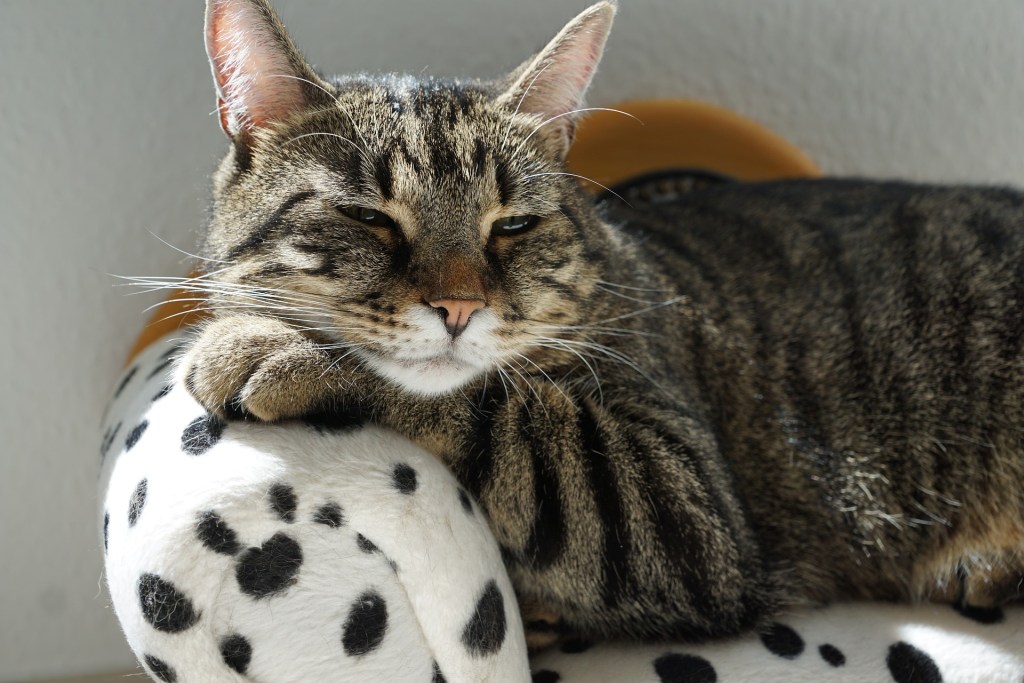If your cat is feeling stressed, the experience can be upsetting for both of you. Stressed cats may exhibit many negative behaviors, including fighting with other cats in your home, hiding, acting aggressively, urinating outside the litter box, and scratching up your walls and furniture. You might be looking for any way you can to help reduce your kitty’s stress, but getting to the root of that stress can sometimes be a challenge. Feliway spray is a simple way to support calmness in your cat while at home or during stressful times like trips to the vet. But to get the best results from Feliway, it’s important to understand what it is, how it works, and how to best use it.

What is Feliway spray?
Feliway spray is a man-made product that mimics the pheromones that cats produce naturally. These are pheromones that your cat releases through glands in his cheek. When your cat is comfy and relaxed, he might rub against you or a piece of furniture. In doing so, he’s releasing those hormones and depositing them on you or another object.
By depositing those pheromones, your cat is signaling that you or that object is part of his territory. The scent of those pheromones is reassuring to your cat, and it makes a place feel familiar to him.
Feliway seeks to reproduce those hormones so that, by using the spray, you can reassure your cat and give him that same sense of calm and familiarity. It supports a calm feeling in your cat.
While your cat can smell the Feliway, the substance is odorless to humans, so you can use it in your home and vehicle.
How to use Feliway spray
Feliway spray can be useful in several different situations. If your cat is nervous about a trip to the vet or groomer, you can spray his carrier to help reassure him. The same is true of stressful events like a move to a new house or going on a trip. You can use the spray in a room or carrier to promote a sense of calm and relaxation in your cat.
Feliway can also be useful for cats who are displaying stress-related negative behaviors, like urinating outside the litter box or scratching furniture and door frames. By reassuring your cat that your home is his and is a familiar and safe place to be, Feliway may be able to reduce some of these negative behaviors, since your cat might not feel obligated to mark his territory.
The directions on the Feliway spray note that you should spray between eight and 10 pumps of the substance 15 minutes before bringing your cat into the environment. That environment might be a cat carrier, your car, a vet table, or even your cat’s bed. The effects of the spray last between four and five hours, and you can reapply the spray as you feel it’s needed.
It’s important to note that you shouldn’t apply Feliway directly to your cat. You also shouldn’t use it while your cat is in the area that you’ll be spraying, especially when this is a cat carrier.
Additional Feliway products to consider
The Feliway Classic Calming Spray is just one Feliway product you can use. You might also want to explore the other products in the company line:
- Feliway Optimum Cat Enhanced Calming Pheromone Diffuser: This 30-day diffuser automatically and gradually releases Feliway Optimum. Feliway Optimum helps your cat deal with stress and may help reduce scratching, urine spraying, and fights between your cats. The diffuser covers up to 700 square feet.
- Feliway MultiCat Calming Diffuser Kit: This 30-day diffuser kit gradually releases Feliway MultiCat, so you don’t have to worry about spraying your home. This formulation is designed to help reduce conflicts between the cats in your home. It covers up to 700 square feet.
- Feliway Wipes: Rather than spraying Feliway into the air, with these wipes you can apply Feliway directly to your cat’s bedding or carrier. They’re handy and convenient and ideal when you’re traveling with your cat.
Additional ways to minimize your cat’s stress
Feliway can help encourage a sense of calmness in your cat, but it’s important to carefully follow the directions for the best results. With Feliway, you might notice a reduction in stress-related behaviors, like urine spraying and fighting, but you’ll probably see the most improvement when you pair the spray with other stress-reduction techniques for your cat. Reducing your cat’s stress might be as simple as giving him a space in the home that’s entirely his where he’s not disturbed, or teaching your kids how to read your cat’s body language and better respect when he wants to be left alone. The more you can do to make your cat feel comfortable, the better the spray will be able to support those efforts and reduce your cat’s stress.
Editors' Recommendations
- Why do cats twitch in their sleep? The real reasons behind this curious behavior
- Why do cats cover their face when they sleep? This adorable behavior, explained
- When can kittens eat dry food? The lowdown on what you should feed them
- Why do cats open their mouths when they smell? It’s for a really cool reason
- What does it mean when cats purr? It’s more scientific than them just being happy




